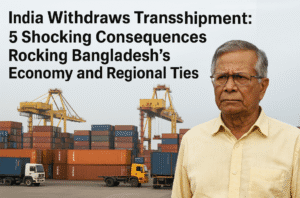India Withdraws Transshipment: 5 Shocking Consequences Rocking Bangladesh’s Economy and Regional Ties
India’s recent decision to revoke transshipment privileges for Bangladesh, citing port congestion, has sent ripples through South Asia’s trade landscape. Though officially attributed to logistical strain, the move is widely seen as politically motivated amid strained ties with Bangladesh’s interim leader, Muhammad Yunus. The policy hits Bangladesh hard, particularly its $47 billion garment industry, which depends heavily on Indian ports for global market access.
Business leaders warn of soaring costs and disrupted supply chains. India maintains transshipment access for Nepal and Bhutan, but the broader economic fallout could strain regional cooperation. With 40% of garment inputs sourced from India, Bangladesh now faces costly imports and export delays, potentially shifting supply chains toward China and Southeast Asia. The diplomatic consequences remain uncertain, especially as Dhaka explores alternative routes like the Japan-backed Matarbari port.
This development reveals how infrastructure challenges and political maneuvering can reshape longstanding trade partnerships in the region.

India Withdraws Transshipment: 5 Shocking Consequences Rocking Bangladesh’s Economy and Regional Ties
In a move with significant implications for regional trade dynamics, India has revoked transshipment privileges for Bangladesh, effective April 8, 2025. The decision, announced by India’s Ministry of External Affairs (MEA), cites severe congestion at Indian ports and airports, which officials claim has delayed exports and increased logistical costs. However, analysts speculate the policy shift may reflect escalating political tensions with Bangladesh’s interim government, led by Chief Advisor Muhammad Yunus, whose administration has faced criticism from New Delhi.
The Immediate Impact on Bangladesh
Transshipment—the process of transferring goods through intermediate hubs—has long been vital for Bangladesh, a nation reliant on Indian ports to access global markets. The withdrawal disrupts supply chains for Bangladeshi exports, particularly its $47 billion ready-made garment industry, which contributes over 80% of the country’s export revenue. Indian ports on the eastern seaboard, such as Kolkata and Visakhapatnam, have served as critical transit points for Bangladeshi goods bound for Europe, the Middle East, and beyond.
MEA spokesperson Randhir Jaiswal clarified that the policy does not affect Bangladesh’s exports to landlocked neighbors Nepal and Bhutan, which will continue transiting through India. Yet, Bangladeshi business leaders warn that the loss of access to Indian ports could inflate shipping costs by 15–20% and delay deliveries by weeks, eroding the competitiveness of its apparel sector.
Political Undercurrents
While India attributes the decision to infrastructure strain, the timing raises questions. The move follows months of strained relations between New Delhi and Dhaka, particularly under the interim leadership of Nobel laureate Muhammad Yunus. Yunus, celebrated globally for pioneering microfinance, has drawn ire from India for his critiques of New Delhi’s regional policies, including its handling of cross-border water disputes and migration issues.
In July 2024, a high-level Bangladeshi delegation visited India to negotiate expanded transshipment access, signaling Dhaka’s reliance on Indian infrastructure. The abrupt reversal eight months later has fueled perceptions that India is leveraging economic tools to pressure Yunus’s government—a charge Indian officials deny.
Industry Appeals for Reconsideration
The backlash from Bangladesh’s private sector has been swift. Faruque Hassan, former President of the Bangladesh Garment Manufacturers and Exporters Association (BGMEA), urged India to reconsider, emphasizing the symbiotic trade relationship: “We import $8 billion annually in textiles, machinery, and chemicals from India. This decision harms both nations.”
Bangladesh’s garment industry, which sources 40% of its raw materials from India, now faces a dual challenge: pricier imports and costlier exports. Experts warn that prolonged disruptions could push Bangladeshi manufacturers toward alternative suppliers in China or Southeast Asia, undermining India’s market share.
Broader Regional Implications
The decision underscores fragile interdependencies in South Asia. While India seeks to prioritize its export efficiency, the move risks alienating a key regional partner. Bangladesh, meanwhile, may accelerate plans to diversify its trade routes, including through its newly operational Matarbari deep-sea port, built with Japanese assistance.
Historically, India and Bangladesh have cooperated closely on trade, with India granting Bangladesh duty-free access to its market for all goods except arms and alcohol. However, recent friction over Yunus’s leadership style and his vocal stance on regional issues has tested this partnership.
What Lies Ahead?
As Bangladeshi businesses scramble for alternatives—such as rerouting shipments through Sri Lanka or Singapore—the diplomatic fallout remains uncertain. India’s insistence on “logistical necessity” may face scrutiny if port congestion data fails to justify the policy. Conversely, if Yunus’s government adopts a conciliatory tone, negotiations could resume.
For now, the episode highlights how infrastructure limitations and political discord can collide, reshaping trade alliances in one of the world’s most densely populated regions. Stakeholders across South Asia will be watching closely to see whether economic pragmatism or geopolitical posturing prevails.
You must be logged in to post a comment.